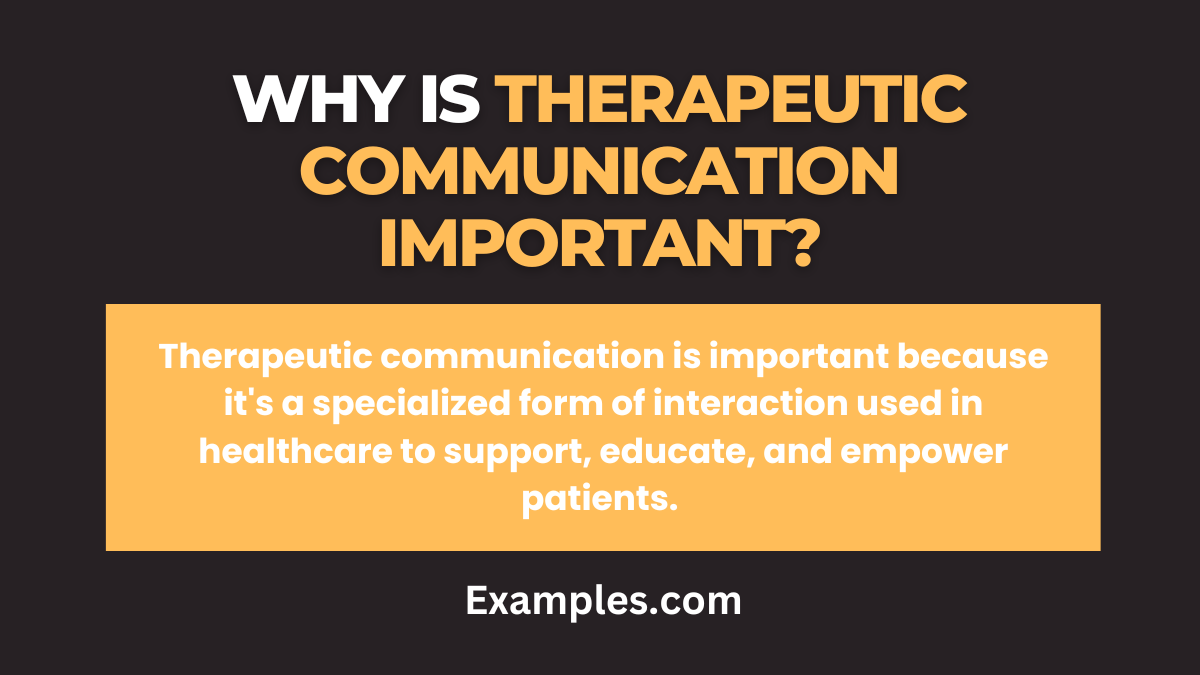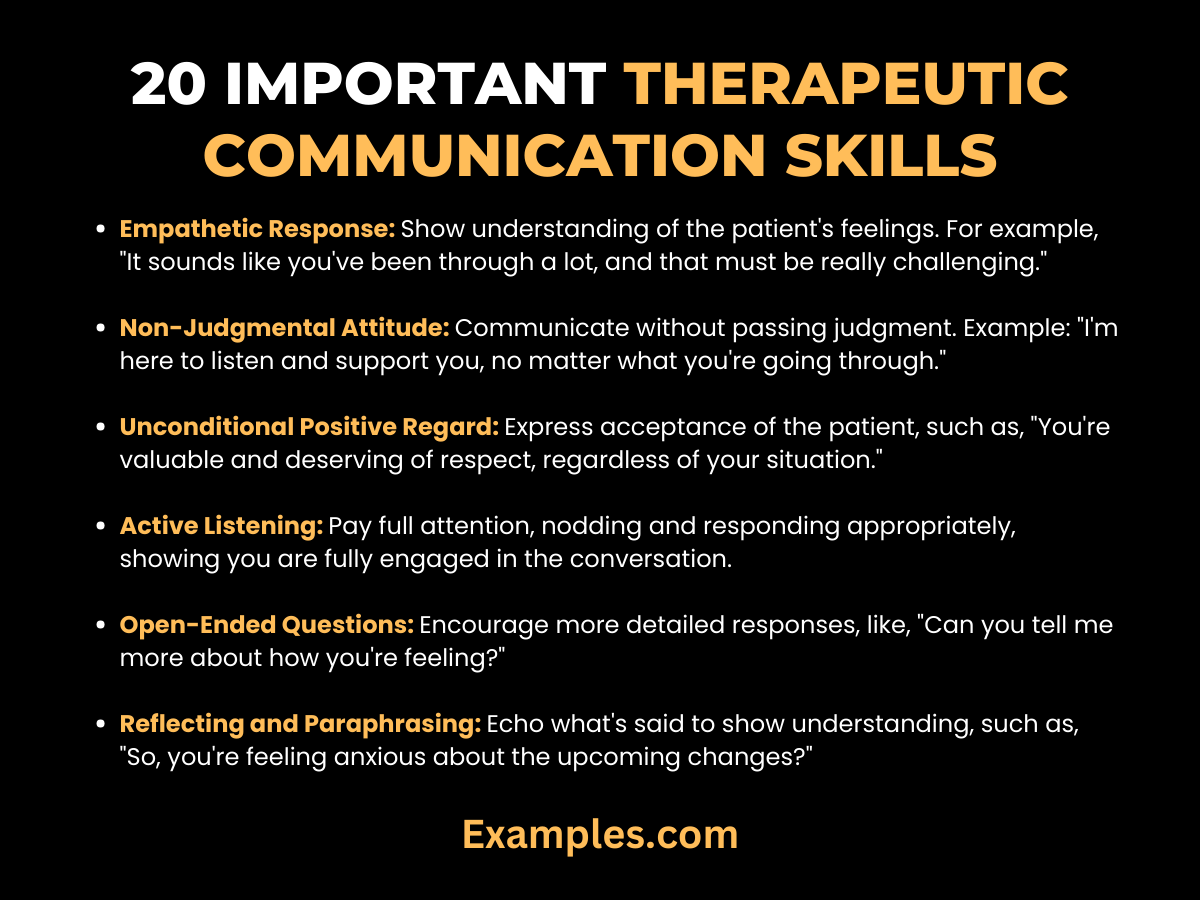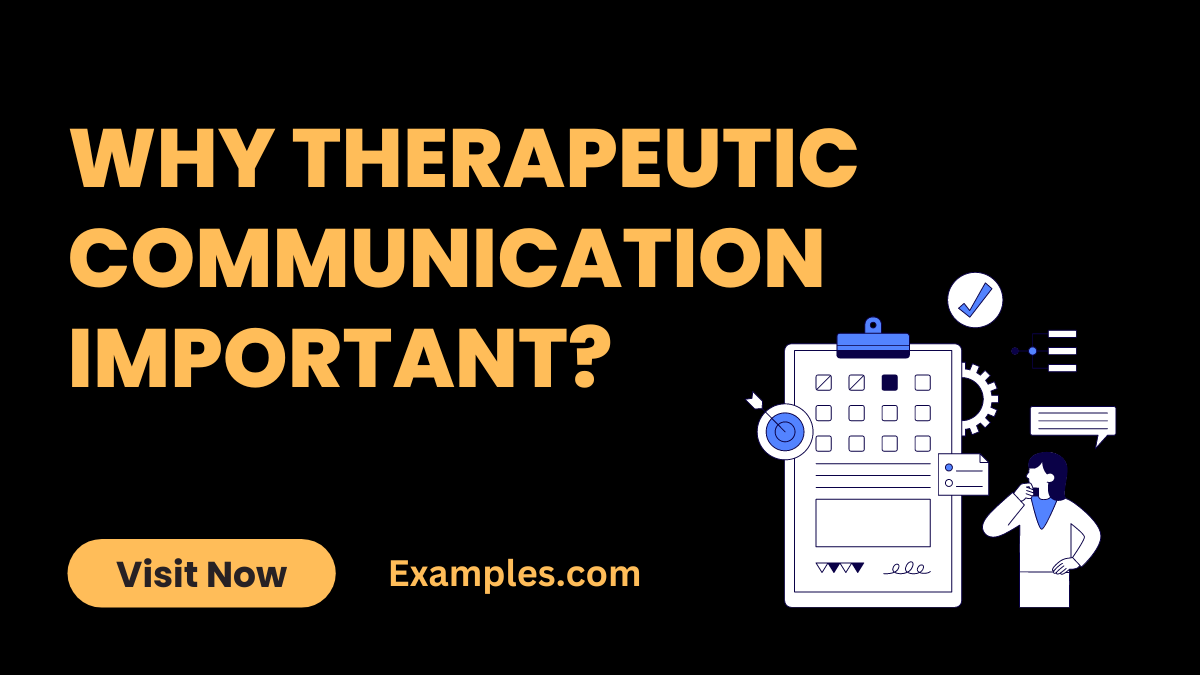Why Is Therapeutic Communication Important?
Explore the essential role of Therapeutic Communication in healthcare with our comprehensive guide. This resource highlights why these skills are critical for effective patient care, featuring real-world oral communication examples to illustrate key points. From fostering trust to enhancing treatment outcomes, learn how therapeutic communication impacts every aspect of patient interaction. This guide provides valuable insights for healthcare professionals seeking to improve their communication skills, ensuring a deeper understanding and better patient care.
Why Is Therapeutic Communication Important?

Therapeutic communication is important because it’s a specialized form of interaction used in healthcare to support, educate, and empower patients. It involves techniques like active listening, empathy, and clear, respectful speaking to help patients feel understood and valued. This type of communication is crucial in building trust between healthcare providers and patients, ensuring patients’ needs are met, and improving their overall care and well-being. It’s especially important in sensitive situations, where effectively communicating can significantly impact a patient’s emotional and physical health.
20 Important Therapeutic Communication Skills
Dive into the essential world of 20 Important Therapeutic Communication Skills and their impact. This guide, offers a comprehensive overview of the key communication skills crucial in therapeutic settings. From healthcare to mental health counseling, these skills are fundamental in establishing trust, understanding, and effective treatment outcomes. Each skill is illustrated with a unique example and detailed explanation, demonstrating its practical application and benefits. Ideal for healthcare professionals, educators, and anyone involved in caregiving, this resource equips readers with the tools needed for empathetic, effective, and transformative communication.

- Empathetic Response: Show understanding of the patient’s feelings. For example, “It sounds like you’ve been through a lot, and that must be really challenging.”
- Non-Judgmental Attitude: Communicate without passing judgment. Example: “I’m here to listen and support you, no matter what you’re going through.”
- Unconditional Positive Regard: Express acceptance of the patient, such as, “You’re valuable and deserving of respect, regardless of your situation.”
- Active Listening: Pay full attention, nodding and responding appropriately, showing you are fully engaged in the conversation.
- Open-Ended Questions: Encourage more detailed responses, like, “Can you tell me more about how you’re feeling?”
- Reflecting and Paraphrasing: Echo what’s said to show understanding, such as, “So, you’re feeling anxious about the upcoming changes?”
- Clarifying: Ask clarifying questions to ensure understanding. Example: “When you say ‘overwhelmed’, what specific situations are you referring to?”
- Summarizing: Recap the main points, reinforcing understanding and progress, like, “You’ve mentioned several key issues; let’s go over them to ensure I’ve understood correctly.”
- Genuine Tone: Speak sincerely and authentically, conveying real interest and care.
- Cultural Sensitivity: Communicate with awareness and respect for cultural differences.
- Patient Education: Explain medical or psychological concepts in an understandable way, ensuring patient comprehension.
- Emotional Support: Offer comforting words and emotional support, demonstrating care and empathy.
- Encouraging Self-Expression: Motivate patients to express their thoughts and feelings openly.
- Adaptability: Adjust communication style according to the patient’s needs and responses.
- Assertiveness: Communicate needs and opinions clearly and respectfully, without being aggressive.
- Conflict Resolution: Apply communication skills to resolve misunderstandings or disagreements effectively.
- Body Language Awareness: Use and interpret non-verbal cues like gestures and facial expressions to enhance communication.
- Reassurance: Provide reassurance to alleviate fears and anxieties, such as, “We’re here to support you through this.”
- Motivational Interviewing: Encourage change and self-motivation through targeted questioning and affirmations.
- De-escalation Techniques: Utilize calming communication strategies in high-tension situations to reduce anxiety and agitation.
Why is Therapeutic Communication Important in Nursing?

Building Trust and Rapport
Therapeutic communication in nursing is essential for establishing a strong foundation of trust and rapport with patients. By engaging in empathetic dialogue and showing genuine concern for their well-being, nurses create a sense of safety and understanding. This trust is crucial, especially when patients are sharing sensitive health information.
Enhancing Patient Assessment and Care
Effective therapeutic communication allows nurses to conduct thorough assessments of patients’ physical and emotional needs. Techniques like active listening in Therapeutic Communication help nurses discern subtle cues and symptoms that patients might not explicitly mention. This leads to more accurate diagnoses and tailored treatment plans.
Promoting Patient Comfort and Reducing Anxiety
Through Therapeutic Communication in Nursing, nurses can significantly reduce patient anxiety and discomfort. By employing techniques such as reflecting in Therapeutic Communication and clarification in Therapeutic Communication, nurses reassure patients, helping them feel understood and cared for during their treatment.
Why is Communication Important in Therapeutic Relationships?
Facilitating Emotional Expression and Healing
In therapeutic settings, communication is a tool for emotional expression and healing. Techniques like paraphrasing in Therapeutic Communication and making observations in Therapeutic Communication allow healthcare professionals to validate and understand patients’ feelings, fostering emotional healing.
Enhancing Treatment Engagement and Compliance
Effective communication in therapeutic relationships encourages patients to actively participate in their treatment. Through strategies such as offering self in Therapeutic Communication and asking questions in Therapeutic Communication, healthcare providers can motivate patients to be more engaged and compliant with their treatment plans.
Tailoring Interventions to Individual Needs
In Therapeutic Communication in Psychology and Therapeutic Communication in Psychiatric Nursing, personalized communication is key to developing effective, individualized care plans. It ensures that the treatment approach aligns with the unique needs and circumstances of each patient, leading to better health outcomes.
Why is Therapeutic Communication Important in Patient Care?

Enhancing Patient Understanding and Involvement
Therapeutic communication plays a critical role in patient care by enhancing patient understanding and involvement in their health journey. When healthcare providers engage in clear, compassionate communication, patients are more likely to comprehend their health conditions and the treatments being proposed. Techniques like explaining medical terms in layman’s language and using analogies can make complex health information more accessible. This understanding fosters a sense of involvement and empowerment, encouraging patients to participate actively in their care decisions.
Building a Supportive Healthcare Environment
Creating a supportive and nurturing healthcare environment is another vital aspect of therapeutic communication. This environment can significantly impact a patient’s mental and emotional well-being, which in turn affects their physical health. By using active listening in Therapeutic Communication, healthcare providers can demonstrate empathy and understanding, making patients feel valued and respected. This support can alleviate anxiety and fear, which are common in healthcare settings, especially in situations involving serious illnesses or procedures.
Facilitating Holistic Care
Therapeutic communication is essential for facilitating holistic care, which considers the patient’s physical, emotional, mental, and social needs. By employing techniques such as asking open-ended questions and encouraging descriptions of perception in Therapeutic Communication, healthcare providers can gain a comprehensive understanding of the patient’s overall well-being. This approach enables caregivers to address not just the physical symptoms but also the emotional and psychological aspects of patient care.
Improving Patient Outcomes and Satisfaction
Effective therapeutic communication directly correlates with improved patient outcomes and satisfaction. When patients feel heard, understood, and involved in their care process, they are more likely to adhere to treatment plans and follow through with recommendations. This adherence is crucial for achieving positive health outcomes. Additionally, when patients have a positive communication experience with their healthcare providers, their overall satisfaction with the care they receive increases. This satisfaction is important not only for the patient’s well-being but also for the reputation and success of the healthcare facility.
Overcoming Cultural and Language Barriers
In today’s diverse healthcare settings, therapeutic communication is key to overcoming cultural and language barriers. Tailoring communication styles to meet the cultural and linguistic needs of patients ensures that care is inclusive and equitable. Techniques like using interpreters effectively and being aware of cultural sensitivities in communication can help bridge these gaps, ensuring that all patients receive the care and understanding they need.
In conclusion, therapeutic communication is a fundamental aspect of patient care, central to enhancing patient understanding, creating a supportive environment, ensuring holistic care, improving patient outcomes, and overcoming cultural barriers. For healthcare professionals, mastering these communication skills is not just a professional requirement but a critical component of compassionate and effective patient care.



